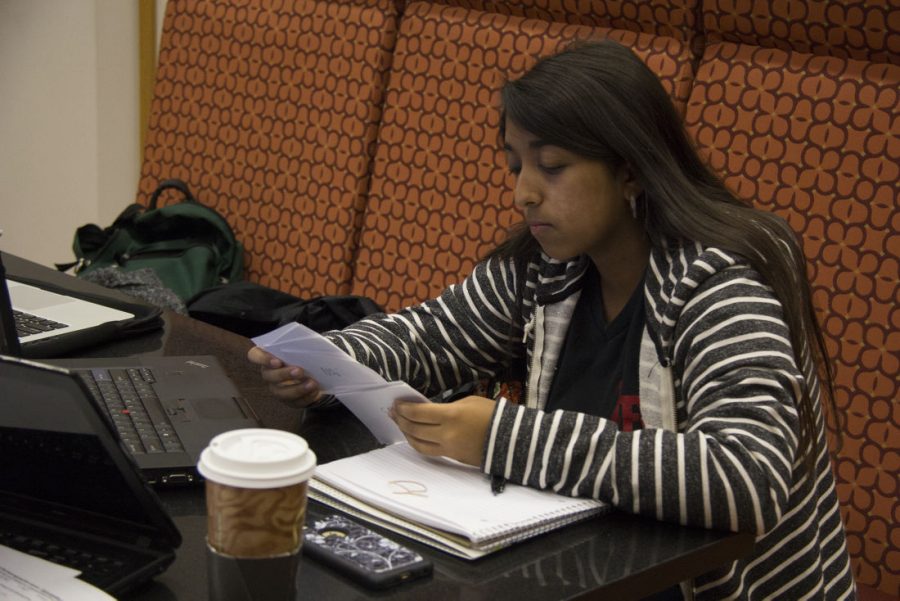Durbin: Bill could lower textbook costs
Nadia Ramos, freshman medical laboratory science major, studies using flashcards Oct. 14 in the Founders Memorial Library Cafe.
October 15, 2015
U.S. Sen. Dick Durbin (D-Illinois) reintroduced a bill last week that could save higher education students millions of dollars in textbook costs.
The Affordable College Textbook Act would encourage universities to support pilot programs that create digital and print open-source textbooks by awarding competitive grants. Durbin originally introduced the bill in 2013, but it was tabled and not revisited until Oct. 8.
“Students know and many parents know that textbook costs are one of the most overlooked barriers to college affordability and access, and they continue to get more expensive,” Durbin said during a press conference on Oct. 8.
Textbook prices have increased by 82 percent from 2002 to 2012, according to the U.S. Government Accountability Office. Students who attended public four-year universities in the 2014-2015 academic year spent an average of $1,225 on textbooks and supplies, according to College Board.
Under an open-source textbook pilot program, universities would be required to create digital educational resources that would be printable and available free of charge, according to the Affordable College Textbook Act. Print versions of open-source books could be available for purchase at affordable costs under the program, said Ethan Senack, U.S. PIRG higher education advocate.
Increasing costs
Senack said publishers have been able raise prices every year because students are not able to choose the textbooks they buy. The average price of new textbooks has risen from $57 in 2007 to $79 in 2013, according to the National Association of College Stores.
“For decades, publishers have capitalized on the capped in market, and this bill restores some competition to an industry where just a handful of giants have managed to prevent it, saving students a ton of money and potentially improving student outcomes at the same time,” Senack said.
The Department of Education awarded the University of Illinois a $150,000 grant in 2012 to include open-source textbooks in the university’s curriculum. The project resulted in the creation of a 560 page open-source book called “Sustainability: A Comprehensive Foundation,” which was authored by University of Illinois professors. The book covers topics including climate and global change, environmental and resource economics, and sustainability planning and infrastructure, among other things.
The University of Massachusetts Amherst saved students $1.5 million over the course of four years through open-source textbook programs, Senack said.
Senior philosophy major Tim Wolfe said he has spent around $330 on textbooks this semester and he still has not purchased a $150 computer science book and four other books ranging $10 to $20.
“Given in past semesters I was told that I was in need of a hundred dollar[s] or so on a textbook that was barely used or referenced, it would definitely be helpful in those situations,” Wolfe said. “While digital copies of everything are nice, I have strong preference towards hard copies. Given that both versions would be offered, whether free or cheap, I believe it would really help.”







